There have been a few attempts at making a 3D board for use with Talisman. SpaceClown Studios created the Epic Talisman board and then last year Crow T Robot (Raymond Cameron), from BGG and the FFG forums, unleashed a truly amazing project onto an unsuspecting public! Raymond has penned a little of the story behind the processes involved in making the board. Hopefully it might inspire others to emulate his work. Cue Enya…
One day I was over a friend’s house for a Friday night game and though we might be playing Supremacy or maybe Car Wars. On the table before me was a new board game with a fantasy theme I’ve never seen before, but looked very promising. I quickly got my soda, opened some chips, sat down and was struck by cool fantasy themed 2nd Edition Talisman board. I picked the first card from the Adventure Deck just to look it over and what card did I pick, but a Talisman.
Mark, an accountant, was always good at explaining new games and I was being rather eager to get started and jumping around the board. Soon we played and it just went great. I forgot really who won and even who I was but I do remember having a great time and many many Talisman games and a few versions later, here I am still enjoying the game even though we can’t get together nearly as often as I’d like.
For years the idea of a 3D board teased at me but I just rejected each one as not worth it or just did not possess the skill. I had over the years become rather a good painter and loved working with Styrofoam. Another game required extensive use of foam to make a WW2 modular battlefield for 15mm plastic tanks. These were copies really of the maps that came with that game only twice as big and having integrated 3D terrain such as hills, rivers, roads and swamps. After making about 30 of these boards I was thinking more about my long ago thoughts on a 3D Talisman Board. No more so since 3rd Edition of the game came out with the smallest and, in my opinion, the worst looking yet. Still I could not make it work in my mind, so I waited again but thought about it more and more.
Fourth Edition came and I was able to find miniatures for the characters that were reasonable facsimiles and to my amazement it had a stunning board that I just loved and even inspired me to do it. Yes, I’d finally do it. Before any hacking on a board a few things had to be ironed out. Just a larger board? If so, how large? How are the 3D elements going to go? First I was leaning towards symbolic small 10mm buildings, and even painted up a few, but then I had second thoughts when I was gleaning the Talisman Forums from someone who was also working on such a project.
I made up my mind to do 25mm 3D scenes for at least the 4 corner Outer Region areas: City, Tavern, Chapel and Village. This also came easy because I’d been collecting many pieces of props from my D&D years. Some were painted but most were not. Slowly I just placed some of the elements on the 4th Edition board itself and asked my family’s opinion as it grew and grew. The local game stores and even a pet store or two saw me wandering looking for what ever would strike me. I painted feverishly but still took a month or so before I was done with the pieces. Book cases & tables were particularly difficult to find.
Plans changed however when the first board I tried failed miserably. I thought that a strong board of ¾” plywood under the foam would give it rigidity, but it bent horribly under its own weight. It dawned on me that there would be over 300 individually painted pieces glued on the board and any amount of warping movement while moving the board would over time work themselves loose. I solved this through yet another experiment. I thickened the board and made it up in layers as is seen in the final board. All these glued together with several metal pins throughout gave it a very solid feel even with the weight of the miniatures provided you handle it with some respect. Nothing has fallen off yet and it stands up well to dice being tossed and miniatures being moved about.
Over time it materialized and a problem I’d given thought to, but not solved yet, was coming ever nearer to deal with. Was I to put countless labels all over the board or just leave it up to memory? I finally decided to go with a Cheat Sheet and small color coded thumb tacks on the board itself. There are four colors in all:
Yellow tacks (numbered 1-12) indicate any space where an Adventure Card is likely to be drawn and how many, there are a few Fields numbers and they are all labelled the same number, like the Woods. Orange Tacks (1-12) are for any space that typically requires a dice roll or decision, such as the City or Village. Red and Blue tacks are the Strength or Craft path (1-6) and are just worded like the board and may include some Rules FAQ in the future.
That taken care of it was time to play, we had a little hard time finding our miniature in all the eye candy but looking up the codes were not a problem as I just made a few copies. You also need to occasionally help each other out with moving the miniature around as it gets across the large board but at least two of the players regularly got out of their seats and moved over for a better view of where they were as it was a constantly revolving diorama. I gave some thought on making a few 3D representations of some more permanent cards with a copy of the card itself on the bottom of a base and have them close by and but them out on the board particularly the Magic Portal, Pool of Life, Magic Stream and the like, but I’ve not tackled that one yet!!!
I hope you enjoy the pictures I have up on Photobucket and the one video so far up on YouTube.
Raymond Cameron (Crow T Robot)
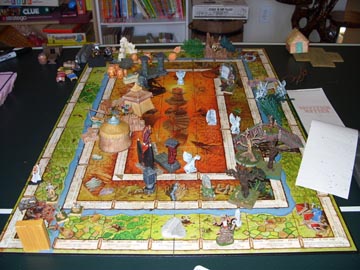 |
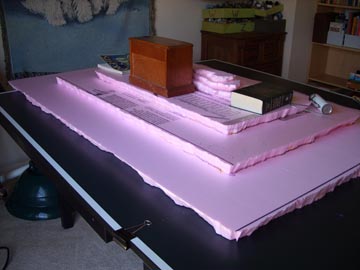 |
||
| The Idea | Basic Layout | ||
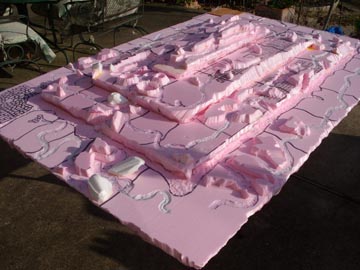 |
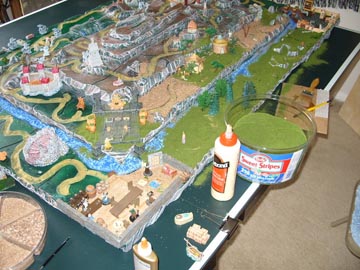 |
||
| Carving Detail | Painting & Flocking | ||
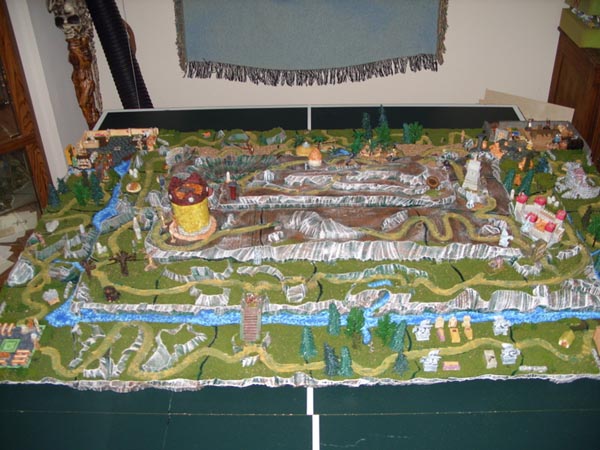 |
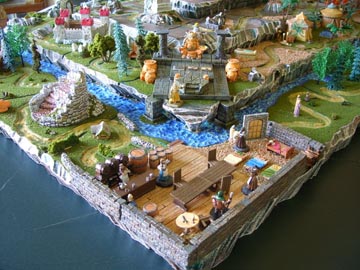 |
||
| TADA!!! | Tavern | ||
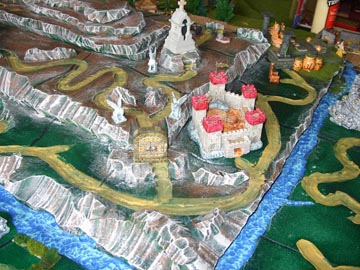 |
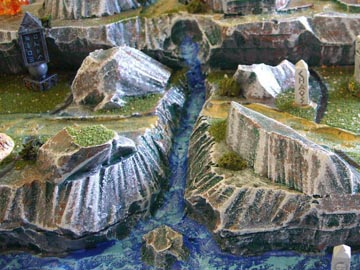 |
||
| Portal of Power | Chasm | ||
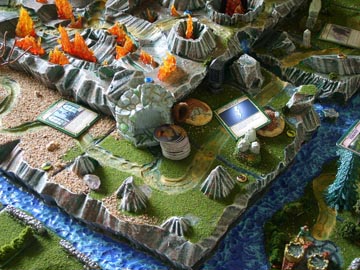 |
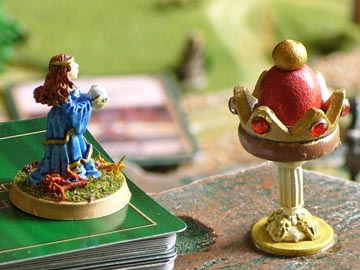 |
||
| Warlock’s Cave | Crown of Command |
